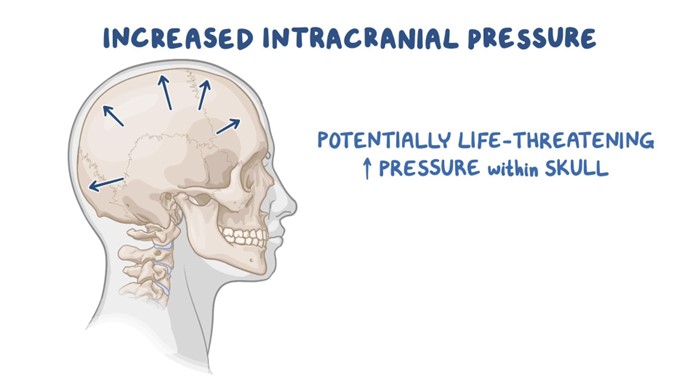A nurse is monitoring a client who had a cerebral aneurysm rupture. Which of the following findings should the nurse identify as a manifestation of increased intracranial pressure?
Hypertension
Tinnitus
Hypotension
Tachycardia
The Correct Answer is A
Choice A reason: Hypertension is a manifestation of increased intracranial pressure, as it reflects the body's attempt to maintain adequate cerebral perfusion pressure (CPP) and blood flow to the brain. CPP is the difference between the mean arterial pressure (MAP) and the intracranial pressure (ICP). When ICP rises, MAP must also rise to keep CPP constant and prevent cerebral ischemia. Hypertension is part of the Cushing's triad, which is a classic sign of increased ICP that also includes bradycardia and irregular respirations.
Choice B reason: Tinnitus is not a manifestation of increased intracranial pressure, as it does not affect the auditory system. Tinnitus is a ringing, buzzing, or hissing sound in the ears that can be caused by various factors, such as ear infections, noise exposure, medications, or aging. Tinnitus may be associated with other neurological conditions, such as Meniere's disease, acoustic neuroma, or multiple sclerosis, but not with increased ICP.
Choice C reason: Hypotension is not a manifestation of increased intracranial pressure, as it indicates a decrease in MAP and CPP, which can lead to cerebral ischemia and infarction. Hypotension can be caused by various factors, such as blood loss, dehydration, shock, or medications. Hypotension may worsen the outcome of increased ICP by reducing the oxygen and nutrient delivery to the brain.
Choice D reason: Tachycardia is not a manifestation of increased intracranial pressure, as it contradicts Cushing's triad. Tachycardia is an increase in heart rate that can be caused by various factors, such as anxiety, pain, fever, dehydration, or medications. Tachycardia may increase the oxygen demand and metabolic rate of the brain, which can exacerbate the effects of increased ICP.

Nursing Test Bank
Naxlex Comprehensive Predictor Exams
Related Questions
Correct Answer is B
Explanation
Choice A reason: A black tag is not the appropriate priority tag for this client, as it indicates that the client is dead or has injuries that are incompatible with life. A black tag is used for clients who have no signs of life, such as pulse, respiration, or pupillary response, or who have severe injuries that cannot be treated with the available resources, such as massive head trauma, decapitation, or incineration. A black tag means that no further care or intervention is provided to the client.
Choice B reason: A red tag is the appropriate priority tag for this client, as it indicates that the client has life-threatening injuries that require immediate attention and treatment. A red tag is used for clients who have compromised airway, breathing, or circulation, such as respiratory distress, shock, severe bleeding, chest pain, or head injury. A red tag means that the client is given the highest priority and is treated as soon as possible.
Choice C reason: A green tag is not the appropriate priority tag for this client, as it indicates that the client has minor injuries that do not require urgent care or intervention. A green tag is used for clients who have stable vital signs and can walk or move without assistance, such as abrasions, sprains, fractures, or minor burns. A green tag means that the client is given the lowest priority and is treated after all other clients.
Choice D reason: A yellow tag is not the appropriate priority tag for this client, as it indicates that the client has serious injuries that require observation and treatment within a short time frame. A yellow tag is used for clients who have potential complications or deterioration of their condition, such as abdominal pain, pelvic injury, open wounds, or spinal injury. A yellow tag means that the client is given the second highest priority and is treated within 30 to 60 minutes.
Correct Answer is C
Explanation
Choice A reason: "Diet and exercise is good for you and good for your heart." This statement is true, but it is not the appropriate nursing response. It does not address the client's concerns or provide any specific information about cardiac rehabilitation. It may also sound dismissive or patronizing to the client.
Choice B reason: "It's not unusual to feel that way at first, but once you learn the routine, you'll enjoy it." This statement is empathetic, but it is not the appropriate nursing response. It does not explain the purpose or benefits of cardiac rehabilitation. It may also sound unrealistic or optimistic to the client.
Choice C reason: "Cardiac rehabilitation cannot undo the damage to your heart, but it can help you get back to your previous level of activity safely." This statement is the appropriate nursing response. It acknowledges the client's condition and provides factual information about cardiac rehabilitation. It also emphasizes the positive outcomes of cardiac rehabilitation, such as improving physical function, reducing symptoms, and preventing further complications.
Choice D reason: "Your doctor is the expert here, and I'm sure he would only recommend what is best for you." This statement is respectful, but it is not the appropriate nursing response. It does not answer the client's question or provide any education about cardiac rehabilitation. It may also sound evasive or deferential to the client.
Whether you are a student looking to ace your exams or a practicing nurse seeking to enhance your expertise , our nursing education contents will empower you with the confidence and competence to make a difference in the lives of patients and become a respected leader in the healthcare field.
Visit Naxlex, invest in your future and unlock endless possibilities with our unparalleled nursing education contents today
Report Wrong Answer on the Current Question
Do you disagree with the answer? If yes, what is your expected answer? Explain.
Kindly be descriptive with the issue you are facing.
